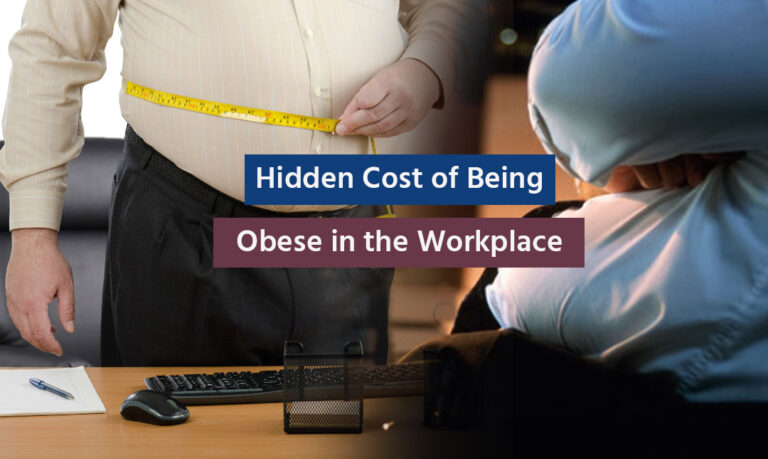
Vidhi Dave
Bariatric Dietician & Content Writer
Hidden Cost of Being Obese in the Workplace

In the fast-paced world of modern businesses, where innovation and productivity are the keywords of success, a place where people from all fields come together to contribute their skills, knowledge, ideas and their energy. However, a silent struggle goes unseen and unspoken. Every day, millions of overweight individuals fight this conflict as they negotiate the difficult landscape of professional life. While the effects of obesity on personal health are well-documented, the hidden costs of being weighed down at work are typically covered up in mystery.
Let’s reveal how obesity can impact your life apart from a health point of view and how it hinders obese employees in their careers, and how these challenges, in turn, impose a significant cost on both individuals and companies.
Obesity is a worldwide problem, with rates rapidly growing in recent decades. According to the World Health Organization (WHO), over 1.9 billion persons worldwide were overweight in 2016, with over 650 million being obese. This health problem has severe consequences that go beyond physical health and into work and social well-being.
Yet, for many, the challenges of the obese are generally unnoticed. In a society that often associates being thin with success, overweight and obese people may find themselves at a disadvantage in the workplace, dealing with discrimination that goes unnoticed by others. Weight bias in the workplace is an unpleasant problem that is firmly rooted in our cultural views and is frequently maintained without our conscious understanding.
The Impact of being obese on work performance:
Being overweight may adversely impact one’s work performance and productivity. Being overweight can have the following effects on work performance:
Career Advancement Is Limited:
Obesity might act as a hidden hindrance to career advancement. Numerous studies have found that obese people are less likely to be promoted than their non-obese colleagues, regardless of their qualifications or job performance. This transparent wall can have long-term consequences, such as pay inequality and fewer possibilities for professional advancement.
Unfair Hiring Procedures
Obese people may suffer discrimination from the start of their employment search. According to research, overweight or obese candidates are less likely to be chosen for job interviews, owing to appearance bias. This bias deprives firms of potentially skilled employees and undermines attempts to build diverse and inclusive environments.
Wage Differences
Obesity in the workplace is serious. financial repercussions. Obese employees often earn less than their thinner colleagues, even when their backgrounds and skills are comparable. This salary gap may extend the cycle of deprivation and biasedness, making it more difficult for obese individuals to move away from the restrictions of financial instability.
Problems with Mental Health
Obesity-related employment discrimination can have a devastating emotional impact. Obese people are more likely to suffer from mental health difficulties such as depression, anxiety, and low self-esteem. These difficulties may also hinder job performance, limiting their ability to excel at work.
Solution to address Obesity
Carrying out awareness and education projects is a crucial initial move toward reducing obesity discrimination in the workplace.
Encourage staff to participate in physical, mental health, and stress-reduction activities. Make certain that these programs are accessible to people of all sizes and fitness levels.
Create a supportive work environment in which employees can express their feelings. Encourage open communication between supervisors and colleagues, and make it simple that weight or appearance issues will not be tolerated. Encourage a respectful and inclusive atmosphere in which all employees feel appreciated and accepted.
So if you are someone who is struggling from obesity or being overweight, it is important to seek help from a doctor or dietician. They will help you to assess your health status, identify your goals and provide you with a personalized diet. Depending on your diet history, medical history and BMI doctor may suggest Bariatric Surgery, which is the only line of treatment for obesity.
Bariatric surgery is the scientific solution to obesity. Bariatric surgery offers hope and a new beginning to people who have tried and failed with other weight loss strategies. Bariatric surgery will not only help you to lose weight but gain your overall confidence.
Also Obesity-related employment repercussions are varied and far-reaching. Obese people experience considerable obstacles in their work lives, ranging from discrimination and limited employment choices to differences in income and mental health issues. It is critical to recognize and solve these concerns in order to promote a more inclusive and equal work environment.
Creating workplace rules that promote diversity, inclusivity, and equal chances, as well as education and awareness efforts, can help combat weight-based discrimination and guarantee that all employees, regardless of weight, have a fair chance to prosper in their careers. It is essential to acknowledge that skill, dedication, and capacities are not dictated by one’s body size, and that everyone deserves an environment free of bigotry and discrimination.
At Aastha Bariatric, we give our patients thorough information on bariatric surgery, including what to expect after the procedure, its advantages, dangers, and the healing process.From the initial consultation to the post-operative care, our pledge is to provide our patients with compassionate, understanding, accommodating, enlightening, and encouraging assistance throughout their bariatric surgery journey.
How to tackle obesity stigma ?
To tackle obesity stigma, we must first acknowledge its presence and comprehend its negative consequences. Obesity education and awareness efforts can help eliminate myths and misconceptions by highlighting the complexity of the disease. It is critical to promote an open and judgment-free discourse regarding obesity.
Obesity is a medical problem and should be treated like one. Understanding and concern for obese people are essential for decreasing stigma. This is attentively listening to their stories, understanding their difficulties, and not making assumptions. We can build a more inclusive and compassionate society by developing understanding and support.
By taking this social stigma, in a positive way and can decide to overcome this disease called OBESITY.
But How ?
By taking a step towards bariatric surgery. Bariatric surgery is a weight loss surgery which helps to lose weight. Bariatric surgery is the only line of treatment for people who are obese or who have a BMI more than 30.
Based on the patient’s BMI, medical history, diet history and by performing some tests, a bariatric surgeon will choose which procedure is ideal for each individual patient.
Apart from weight loss, bariatric surgery has a number of other advantages. Considering medical history, any pre-existing diseases such as diabetes, hypertension, sleep apnea, or joint difficulties. Certain bariatric surgeries, such as gastric bypass, have shown better results for people with specific medical issues.
Bariatric Surgery not only helps you to lose weight but gain confidence and improve their overall well being over the period of time. Also due to bariatric surgery, many patients have improved mental health and reduced anxiety and depression symptoms post bariatric surgery.
People who once felt restricted by their weight can now seek new employment options, participate in social activities, and cultivate healthier relationships. This enhanced confidence can lead to a more fulfilled and rewarding existence in general.
Also when people lose weight, they begin noticing themselves in distinct ways. Instead of being a source of insecurity, the reflection in the mirror now becomes a source of pride. A transition from obese to a healthy weight results in a change in self-image. Patients no longer feel burdened by their extra weight, but rather have a restored sense of self-worth.
Conclusion:
So now obesity is a global epidemic that affects everyone in some way. And this knowledge should serve as a wake-up call, because there is some good news among the bad: obesity is preventable. We can reverse the tendencies that contributed to the current epidemic by changing governmental policies and practices such that healthy eating and physical activity are easy choices for everyone.
Bariatric surgery is about more than just losing weight; it’s about receiving a new lease on life, a new confidence, and a brighter future. It enables people to take charge of their health and implement a more positive self-image, leading to a better and more satisfying existence.
The physical and emotional improvements that patients go through are accompanied by an increase in self-confidence. People restore their sense of self-worth and purpose when they recover control of their health and bodies.
Aastha Bariatrics is the center of excellence. Center of Excellence in Bariatric & Metabolic Surgery certification is awarded to a facility and its associated surgeons who have successfully completed the designation process of delivering high quality pre operative and long term follow-up care.





